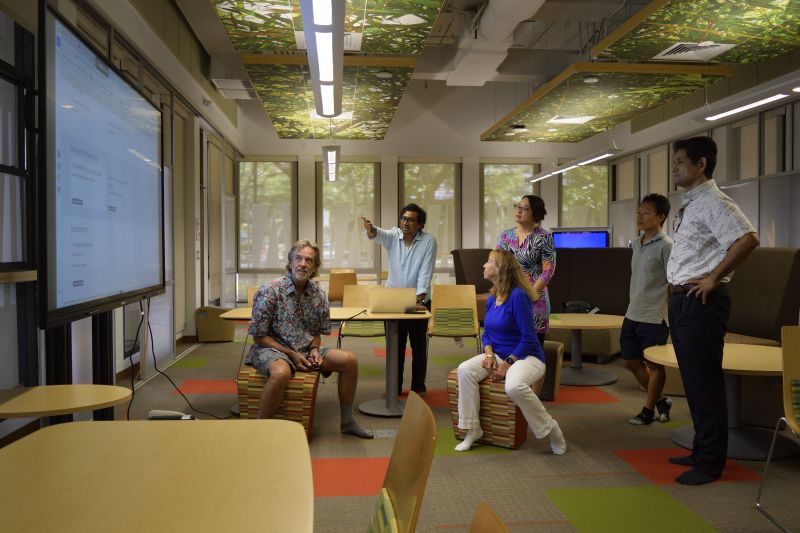The U.S. National Science Foundation announced 22 new awards through the agency's NSF Research Traineeship program, expanding NRT's reach to 45 states, the District of Columbia and the U.S. Virgin Islands. The nearly $63 million investment includes $6 million of support from the "CHIPS and Science Act of 2022."
The program engages graduate trainees in convergence research and innovative traineeship activities to prepare the STEM leaders of tomorrow in areas of national critical interest. Such areas include artificial intelligence, climate resiliency, quantum materials, and STEM entrepreneurship. Collaboration with private, academic, governmental and other partners is strongly encouraged. The program is creating a new generation of STEM talent that reflects the diversity of the nation’s communities and is prepared to develop innovative solutions to future challenges. Over 1,000 trainees were supported in Fiscal Year 2022.
"From its emphasis on recruiting and retaining a diverse student population to the investment in evidence-based, interdisciplinary research and education, the NRT program lies at the heart of what we aim to do here at NSF," said NSF Assistant Director for STEM Education James L. Moore III. "Supporting the preparedness and training of future STEM leaders is essential for tackling the grand challenges of today and tomorrow."
These ambitious NRT projects will delve into areas such as AI, genomics, quantum materials, applied Big Data, STEM entrepreneurship, sustainability and more. This year’s awardees span 16 states, including Hawaii and Nevada (newly added to the NRT portfolio), six EPSCoR jurisdictions, two Hispanic-serving institutions and one historically black university. They will add to the 122 projects currently supported by the program across the United States.
The NRT 2023 awards include the following projects:
- A Convergent Training Program on Biological Control, Boston University.
- Chemically-mediated Biotic Interactions in the Age of Metabolomics, Genomics and Enhanced Macroecological Data, University of Nevada.**
- AI Advancements and Convergence in Computational, Environmental, and Social Sciences, Washington University.
- Alabama Collaborative for Contemporary Education in Precision Timing, University of Alabama.
- Quantum Photonics Interdisciplinary Training to Advance Quantum Technologies, University of New Mexico.*
- Interdisciplinary Graduate Program in Quantum Materials Science and Engineering at Yale, Yale University.
- Ecosystem Science in the Face of Rapid Ocean Change: A Convergence Approach, University of Maine.
- Artificial Intelligence for Changing Climate and Environmental Sustainability, Morgan State University.
- Big Data Water Science for Sustainability and Equity, Michigan State University.
- Computational Research for Equity in the Legal System, University of California, Berkeley.
- Stakeholder Engaged Equitable Decarbonized Energy Futures, Lehigh University.
- Data in Engineering and Society: Converging Applications, Research, and Training Enhancements for Students, University of Hawaii.**
- Harnessing AI for Inverse Design Training in Advanced and Sustainable Composites, Clemson University.
- A New Interdisciplinary Degree Program for Convergent Research and Graduate Training in Quantum Information Science and Engineering, The Ohio State University.*
- Bridging the Gap Between 2D Quantum Materials and Engineering in STEM Education, University of Arkansas.**
- Convergent Next-Generation Robotics Training: Leadership, Entrepreneurship, and Adaptive Design Amid a Changing World of Work, Washington State University.
- Platforms for Exchange and Allocation of Resources, Northeastern University.
- Advancing Materials Frontiers With Creativity and Data Science, University of Missouri.
- Integrative Training in Data Science-Enabled Sensing of the Environment for Climate Adaptation, Michigan Technological University.
- Transdisciplinary Research and Education for Air and Water Resources Solutions in Coastal Communities, Texas A&M University-Kingsville.
- Using a Data Analytics Framework to Merge STEM and Entrepreneurial Training, Oakland University.
* Award funded through the "CHIPS and Science Act of 2022" (Public Law 117-167)
**Award partially funded by NSF EPSCoR
The NRT program advances research by training graduate students in interdisciplinary or convergent research areas through a comprehensive traineeship model that is innovative, evidence-based and aligned with evolving workforce and research needs. The program is transforming STEM graduate education across the nation; institutional support is critical for sustaining the successes of the program.
Read more about the NSF Research Traineeship program and visit nsf.gov.

